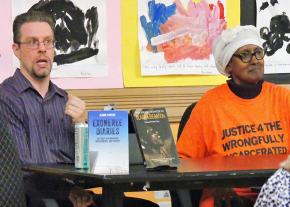Discussing the way toward justice in NYC
reports from New York City on a meeting taking stock of today's challenges and opportunities for activists fighting the criminal injustice system.
THE GROUP Justice 4 the Wrongfully Incarcerated sponsored a January 28 meeting titled "Justice in the Time of Trump" in Harlem in New York City. Speakers included former Assemblyperson Keith Wright; Sharonne Salaam, mother of Central Park Five exonoree Yusef Salaam; and myself, an attorney and activist with the International Socialist Organization.
Speakers addressed the urgent need for reform of New York's criminal justice system, including the bill currently pending in the New York state legislature (A10169A) that for the first time would give automatic compensation to those wrongfully convicted and then exonerated.
The discussion highlighted current criminal justice issues, such as the Obama administration's use of drones deep inside Mexico so the U.S. can continue to prosecute its failed "war on drugs."
Another concern is stepped-up surveillance by the Department of Homeland Security under the broad category of "wide-area surveillance." This has morphed into using aircraft in cities like Compton, California, and Baltimore, Maryland, to monitor Black Lives Matter protests, bringing COINTELPRO into the 21st century.

Speakers also addressed racial profiling and surveillance of Arabs and Muslims. On the campaign trail, Donald Trump stated, "I want surveillance." What may be obvious is that he means surveillance of Muslims specifically. What may be less obvious is that such surveillance targets all of us--though, of course, Muslims and communities of color get disproportionate focus.
Unfortunately, the tools that were refined and honed under Obama--such as the NSA vacuuming up data from e-mail and cell phone usage of every American--are now in the hands of Trump, who is even more committed to using and expanding this kind of surveillance. One example is the expansion of facial recognition surveillance, which is just another way to make racial profiling acceptable, since those who "fit the profile" of terrorists and criminals may also "fit the profile" of ordinary Arabs, Blacks and Latinos.
We have already seen efforts in eight states to ramp up criminal penalties against peaceful protesters, such as increased sentences for those blocking traffic. A couple examples of the crackdown are a North Dakota law allowing motorists to run over protesters and an Indiana law instructing police to use "any means necessary" to clear protesters.
Advocates of reforming the criminal justice are also concerned about the reinvigoration of private prisons. Obama had proposed phasing them out over time as their contracts ended--and his policy only affected criminal institutions, not immigration detention facilities.
Speakers also expressed concern that Jeff Sessions, nominated to be the new U.S. Attorney General, is an unrepentant drug warrior who enthusiastically embraces civil asset forfeiture, lies about crime statistics, and has a history of racially prejudiced comments.
Trump himself has backed higher mandatory minimum sentences and proposed a national stop-and-frisk program, but without the power or authority to enact it on the local level. Moreover, Neil Gorsuch, Trump's nominee to the Supreme Court, is at the least the equivalent of Scalia--if not more reactionary--meaning he'll most likely oppose any criminal justice reforms. As speakers noted, this is the same Trump who called for the death penalty for the Central Park Five, even though they were exonerated.
DESPITE THESE substantial challenges, presenters did sound hopeful for the prospects of a fightback under the Trump administration.
First, it was noted that the vast majority of incarcerated individuals are in the state prison system, not the federal system, and thus most of America's incarcerated individuals are under the control of state and local policies. This means much of the organizing efforts by criminal justice reform advocates will continue to be on the state and local levels.
Furthermore, states that voted heavily for Trump nevertheless passed criminal justice reforms. For example, Oklahoma, a state that Trump won big, passed a ballot initiative moving many low-level drug crimes for felonies to misdemeanors and shifting funding towards mental health and drug treatment. Several other states eased restrictions on marijuana possession and use.
Speakers ended the meeting noting that our side must organize, organize, organize. People were encouraged to join organizations advocating a social justice agenda, such as Justice 4 the Wrongfully Incarcerated.
At the same time, criminal justice reform activists must embrace intersectionality by going to upcoming national marches being planned around climate change, immigrant rights and LGBT issues--and using those marches to make the connections to show who all these issues are intertwined with criminal justice issues as well.


